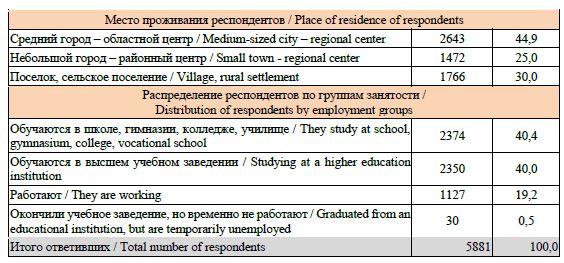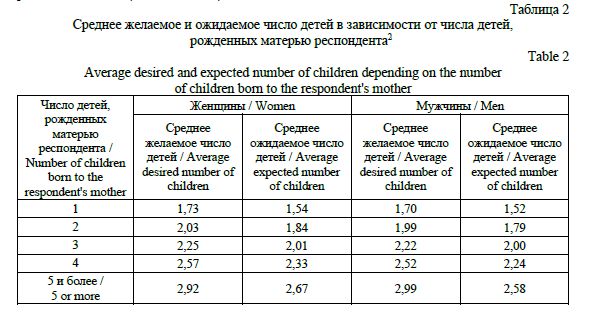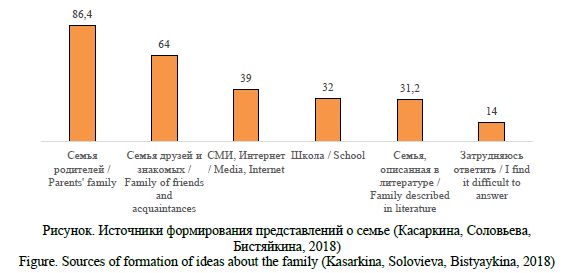Matrimonial dispositions of youth as an object of sociological analysis
Matrimonial dispositions of young people become the basis for forecasting demographic indicators, and their positive dynamics make it possible to talk about the implementation of the objectives of national demographic policy. Control over the dynamics of matrimonial attitudes and dispositions of young people through a monitoring system would allow us to establish trends and tendencies, identify key factors in their formation and predict their transformation into the results of matrimonial decisions and behavior, and determine their consequences for national policies. The purpose of the article is to analyze the empirical experience of studying matrimonial dispositions of young people and to determine the dynamic trends in their formation. The article presents the results of empirical experience in research on matrimonial dispositions of young people in Russia (2015-2023), as well as data from a study of matrimonial strategies of young people (2023, N = 5881), conducted in the Belgorod region. These studies show wave dynamics in the indicators of matrimonial dispositions, which may be due to a change in generations in research, as well as emphases of national policies that affect the socialization conditions of young people. The risks associated with the gender discrepancy in relation to matrimonial strategies (including reproductive behavior) identified in recent studies, as well as the increased rate of commitment among young people to alternative matrimonial ideologies of celibacy and childfree are outlined.
Figures










Shapovalova, I. S. (2024), “Matrimonial dispositions of youth as an object of sociological analysis”, Research Result. Sociology and Management, 10 (4), 167-191. DOI: 10.18413/2408-9338-2024-10-4-0-9


















While nobody left any comments to this publication.
You can be first.
Agadzhanova, E. R., Efimova, O. I. (2015), “On the issue of family values: from antiquity to modernity”, Simbirskij nauchnyj vestnik, (2), 134-139. (In Russian)
Antonova, N. L., Shcherbakova, M. V. (2017), “Marital choice: a turn to rationalization”, Diskussija, (8), 44-47. (In Russian)
Blagorozheva, Zh. O., Shapovalova, I. S. (2024), “The influence of alternative values and attitudes on matrimonial strategies of young people”, Social'naja politika i sociologija, 23(2), 30-39. (In Russian)
Bogdanova, I. N., Artamonova, Ya. V. (2022), “Young family as an “elusive” social phenomenon in modern Russian conditions”, Caucasian Science Bridge, (3), 74-82. (In Russian)
Galynskaya, Yu. S., Zvyagintsev, V. V. (2020), “Strategic basis for strengthening the institution of family in Russia”, Sociodinamika, (9), 30-45. (In Russian)
Gafizova, N. B., Tsalko, E. O. (2023), “Perception of childlessness by modern youth (regional aspect)”, Zhenshhina v rossijskom obshhestve, (2), 120-132. (In Russian)
Guzenina, S. V., Kulakova, I. S. (2020), “Causes of marriages and divorces through the eyes of student youth of Tambov”, POISK: Politika. Obshhestvovedenie. Iskusstvo. Sociologija. Kul'tura, (3), 94-104. (In Russian)
Gurko, T. A. (2019), “Students' ideas about parenting and the social roles of men and women”, SNiSP, (2), 65-81. (In Russian)
Gurko, T. A., Khromacheva, A. Yu. (2015), “Sociology students about family, gender and attitudes towards parents”, Vestnik instituta sociologii, (4), 57-71. (In Russian)
Dianova, N. F., Tlemeshok, V. R. (2015), “Some aspects of the divorce problem at the present stage”, Teorija i praktika obshhestvennogo razvitija, (11), 54-56. (In Russian)
Zhuravleva, L. A., Zarubina, E. V., Ruchkin, A. V., Simachkova, N. N., Chupina, I. P. (2023), “Formation of the demographic culture of youth as a social problem”, Obrazovanie i pravo, (11), 407-413. (In Russian)
Zernov, D. V., Iudin, A. A., Ovsyannikov, A. A. (2015), “Youth on the ruins of the USSR (1991-2013)”, Nauka i shkola, (2), 121-138. (In Russian)
Ilyinykh, S. A. (2022), “Values of marriage, parenthood, kinship: meanings and interpretation”, Caucasian Science Bridge, (5), 52-59. (In Russian)
Kalachikova, O. N., Korolenko, A. V. (2018), “Models of reproductive behavior of the population (based on the materials of the Vologda region)”, Narodonaselenie, (2) 110. (In Russian)
Kargapolova, E. V., Lashuk, I. V. (2017), “Family as a value of modern society (based on the results of sociological research in the Astrakhan region of the Russian Federation and in the Republic of Belarus)”, Sociologicheskij al'manah, [Online], available at: https://cyberleninka.ru/article/n/semya-kak-tsennost-sovremennogo-obschestva-po-itogam-sotsiologicheskih-issledovaniy-v-astrahanskoy-oblasti-rossiyskoy-federatsii-i-v. (Accessed 09 May 2024). (In Russian)
Kartseva, L. V. (2018), “Attitude of residents of Tatarstan to family lifestyle”, Vestnik Nizhegorodskogo universiteta im. N. I. Lobachevskogo. Serija: Social'nye nauki, (2), 58-66. (In Russian)
Kasarkina, E. N. (2018), “Family Values of Modern Urban Youth in the Light of Mordvin National Traditions”, Upravlenie gorodom: teorija i praktika, (4), 45-50. (In Russian)
Kasarkina, E. N., Bistiaykina, D. A., Solovieva, T. V. (2018), “Premarital Attitudes and Life Plans of Young People: Sociological Analysis”, Sovremennye issledovanija social'nyh problem, (6), 208-211. (In Russian)
Kasarkina, E. N., Solovieva, T. V., Bistiaykina, D. A. (2018), “Readiness for Marriage and Family Values of Modern Youth”, Kazanskij pedagogicheskij zhurnal, (6), 208-212. (In Russian)
Kislov, A. G., Shapko, I. V. (2016), “Attitude of Student Youth of the Sverdlovsk Region to the Childfree Phenomenon”, Nauchnyj dialog, (2), 362. (In Russian)
Kobleva, Z. Kh., Karataban, I. A., Gubzhokova, N. K. (2022), “Gender dissonance in the context of unregistered marriages among modern youth”, Gumanitarnye, social'no-jekonomicheskie i obshhestvennye nauki, (6), 31-35. (In Russian)
Kulikova, T. I. (2019), “Causes of divorce in young families”, Sociokul'turnye i psihologicheskie problemy sovremennoj sem'i: aktual'nye voprosy soprovozhdenija i podderzhki [Socio-cultural and psychological problems of the modern family: topical issues of support and support], materials of the V International Scientific and Practical Conference], Tula, Russia, 4-5. (In Russian)
Malénova, A. Yu., Stoyko, D. N. (2019), “Divorce in the structure of marital and family attitudes of young people”, Innovacionnyj potencial molodezhi: kul'tura, duhovnost' i nravstvennost': materialy Mezhdunarodnoj molodezhnoj nauchno-issledovatel'skoj konferencii (Ekaterinburg, 2-6 dekabrja 2019 g.) [The innovative potential of youth: culture, spirituality and morality], materials of the International Youth Research Conference (Yekaterinburg, December 2-6, 2019)], Ekaterinburg, Russia, 223-229. (In Russian)
Malimonov, I. V., Korol, L. G., Sinkovskaya, I. G., Rakhinsky, D. V. (2015), “The problem of marital behavior of student youth”, Russian Journal of Education and Psychology, (10), 202-219. (In Russian)
Nemgirova, S. N. (2023), “Gender differences in value orientations of young people”, Vestnik IKIAT, (46), 56-62. (In Russian)
Pavlov, B. S., Pronina, E. I., Berdnik, L. P., Saraikin, D. A. (2020), “Matrimonial socialization of teenagers in the parental family: immutable tasks and annoying obstacles (based on the results of surveys in the Urals in 2000-2020)”, IIzvestija vysshih uchebnyh zavedenij. Ural'skij region, (4), 23-39. (In Russian)
Romanova, E. V., Khvalina, N. A. (2019), “Reasons for the breakup of young families”, Sociokul'turnye i psihologicheskie problemy sovremennoj sem'i: aktual'nye voprosy soprovozhdenija i podderzhki [Socio-cultural and psychological problems of the modern family: topical issues of support and suppor], materials of the V International Scientific and Practical Conference], Tula, 133-134. (In Russian)
Rostovskaya, T. K. (2015), “Features of the matrimonial behavior of Russian youth”, Chelovek v mire kul'tury, (3), 46-52. (P. 49). (In Russian)
Rostovskaya, T. K. (2024), “Features of regulation of marital, reproductive and self-preservation behavior of young people in terms of ensuring demographic security of Russia”, III-j Mezhdunarodnyj demograficheskij forum «Demografija i global'nye vyzovy [The III International Demographic Forum “Demography and Global Challenges”], collection of forum articles, Voronezh, Russia, 162-166. (In Russian)
Rostovskaya, T. K., Rychikhina, N. S. “Reproductive attitudes of Russian students: regional aspect”, Problemy razvitija territorii, 28 (1), 98-114. (In Russian)
Sayashina, N. N. Tyukina, A. A. (2013), “Identification of socio-psychological characteristics of young men and women in choosing a marriage partner”, Russian Journal of Education and Psychology, (2), 63-71. (In Russian)
Sigareva, E. P., Sivoplyasova, S. Yu., Murtuzaliev, S. I. (2018), “Features of marriage, family and migration intentions of modern youth of the Russian Caucasus”, Sociodinamika, (11), 33-44. (In Russian)
Tikhomirov, D. A. (2018), “Dynamics of the attitude of Moscow youth to cohabitation (based on empirical studies of 2009-2017)”, Znanie. Ponimanie. Umenie, (3), 124. (In Russian)
Tlemeshok, V. R, Dianova, N. F. (2015), “Ideas of modern youth about family and marital relations”, Gumanitarnye, social'no-jekonomicheskie i obshhestvennye nauki, (6-1), [Online], available at: https://cyberleninka.ru/article/n/predstavleniya-sovremennoy-molodezhi-o-semeyno-brachnyh-otnosheniyah (Accessed 09 May 2024). (In Russian)
Ustinova, O. V. (2022), “Reproductive attitudes in modern Russian society”, Sociologija, (5), 72-79. (In Russian)
Shingarkina, D. A. (2012), “Study of ideas of modern student youth about marriage”, Vektor nauki TGU, (2), 192. (In Russian)
The article was prepared with the financial support of the state task FZWG-2023-0016, the topic «Life strategies of youth in the conditions of geopolitical transformation of the Russian space».